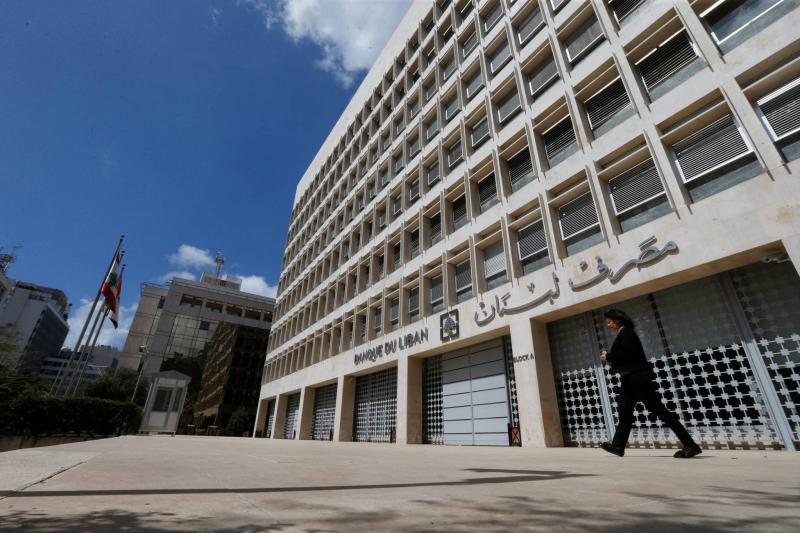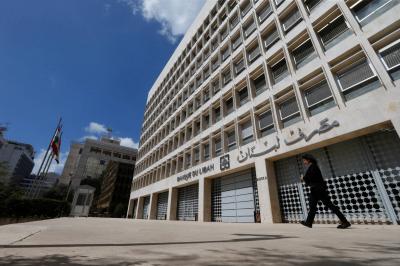The judicial case involving the Governor of the Central Bank of Lebanon, Riad Salameh, and his associates has seen a new development, represented by the German judiciary's request for Lebanon to "obtain documents and records related to their accounts from within the Central Bank."
A judicial source revealed to Asharq Al-Awsat that the Lebanese Prosecutor General, Judge Ghassan Oueidat, had "received a letter from the German side in the past hours via the Lebanese Ministry of Justice, requesting permission to raid the Central Bank of Lebanon and seize documents related to the accounts of Riad Salameh, his brother, and his assistant."
The German request has raised eyebrows in Lebanese circles, which view it as "a violation of the sovereignty of Lebanese institutions." The unnamed judicial source stated that the German letter "clearly expressed its wish to conduct a surprise and rapid raid with security support and participation from Lebanese judges, as part of the assistance Lebanon provides to the European judiciary," considering that "the German request constitutes a violation of Lebanese sovereignty and an infringement on the immunity of official institutions, particularly the Central Bank, which enjoys a special status, especially since the Lebanese judiciary did not carry out such a raid during its independent investigation into the case of the bank's governor."
The judicial source noted that Judge Oueidat "referred the German letter to the first investigating judge in Beirut, Charbel Abu Samra, as the latter is responsible for executing European judicial requests and must provide necessary answers that respect the principle of national sovereignty," stating that "the response of the investigating judge to the German request will not be delayed."
Lebanon commits to respecting cooperation with the European judiciary, in line with the contents of the Anti-Corruption Convention that Lebanon signed in 2008. However, the judicial source indicated that "what the Germans are asking for contradicts the spirit of the convention, which takes into account the principle of preserving the sovereignty of the member states," while also noting that "the German judicial team, which previously participated in European delegations investigating in Beirut with Salameh and officials from the Central Bank and commercial bank owners and directors, insisted solely on receiving documents from the Lebanese legal file, and indeed obtained them."
While the Lebanese judiciary searches for a legal way out to avoid embarrassment in this matter without undermining cooperation with the European judiciary, a delegation from the German embassy visited the Palace of Justice in Beirut and met with some judges. Sources from the Court of Appeal stated that "the visit of the German delegation is normal and periodic, aimed at following up on issues that concern their country." They indicated that "the Lebanese judiciary engages positively and flexibly with all European judicial delegations, listens to their demands, and cooperates with them in a manner that does not violate its authorities and the sovereignty of the state."
They dismissed any rumors that "Interpol" had "withdrawn the arrest warrant issued by the French judiciary against Riad Salameh based on a request from his defense lawyers." The sources confirmed that "the French warrant is still in effect, and that Interpol has not withdrawn it as rumored." They revealed that "the German judiciary did not only circulate the arrest warrant it issued against Salameh, but also allowed its circulation and the publication of available information regarding it. The Public Prosecution has not received anything related to the recovery file of Salameh either from France or Germany."
The first investigating judge in Beirut, Charbel Abu Samra, is expected to hold a session to investigate the indictment by the Public Prosecution in Beirut against Salameh, his brother, his assistant, and anyone who may appear in the investigation related to crimes of "embezzlement, breach of trust, forgery, illicit enrichment, and money laundering." Sources following the case anticipated that "the defendants would be absent from the session, with attendance limited to their defense lawyers, who may request time to present formal defenses." They emphasized that "if the defense attorneys raise the issue of defenses, Judge Abu Samra will be compelled to postpone the session to a later date, possibly for a long period, considering that the judicial holiday begins in mid this month and continues until September 15, unless Abu Samra decides to hold consecutive sessions during the judicial holiday."




